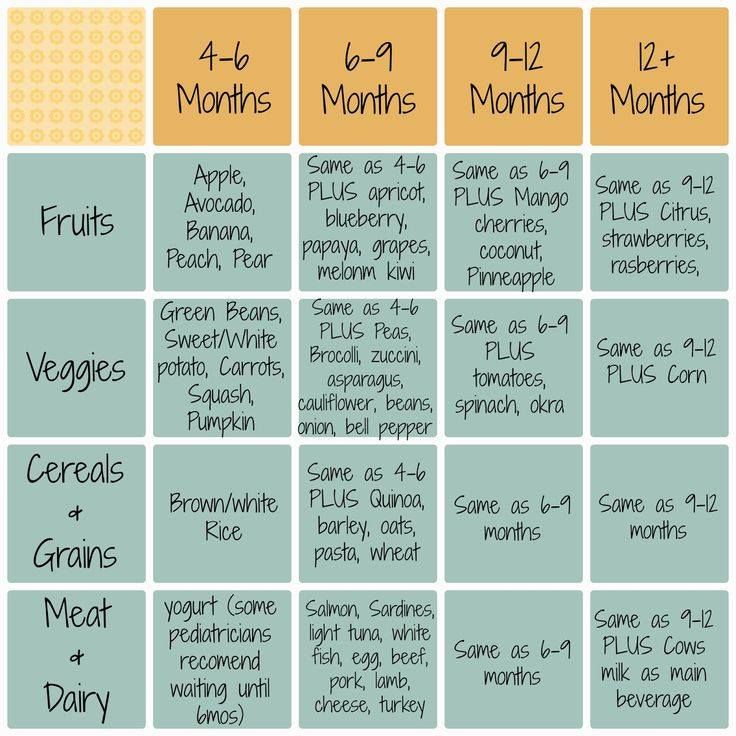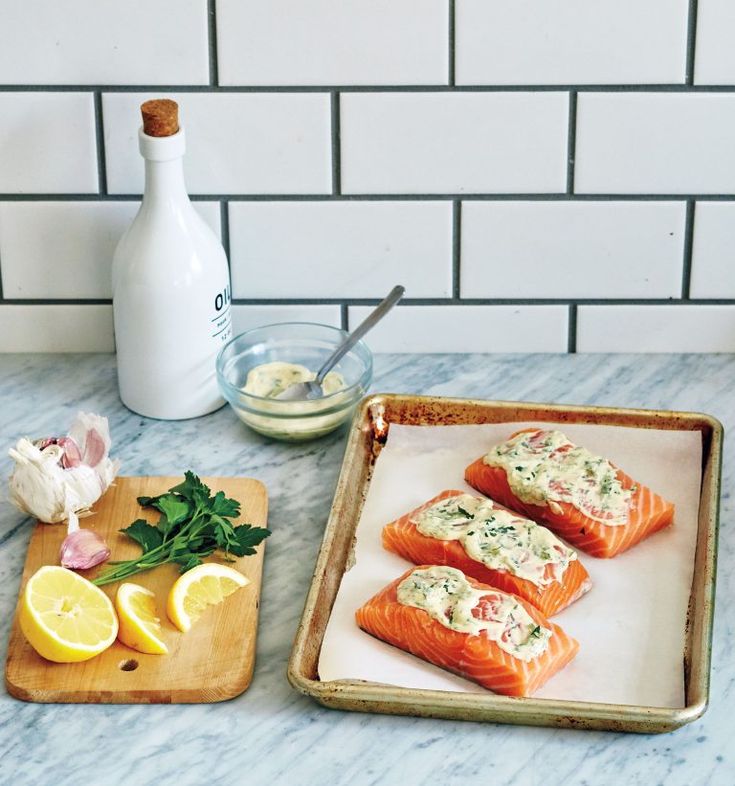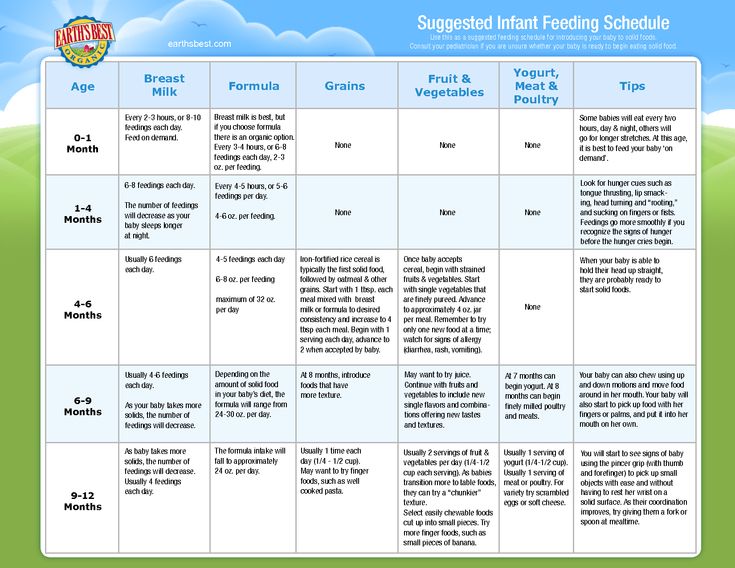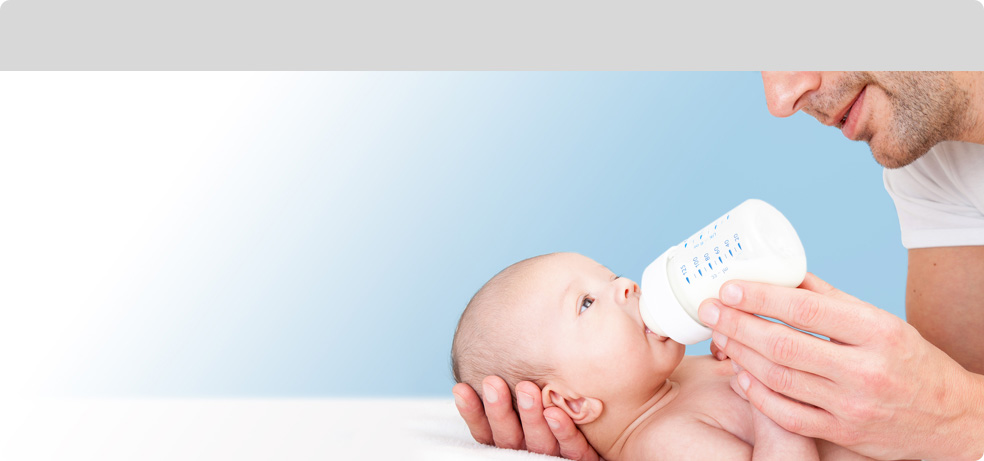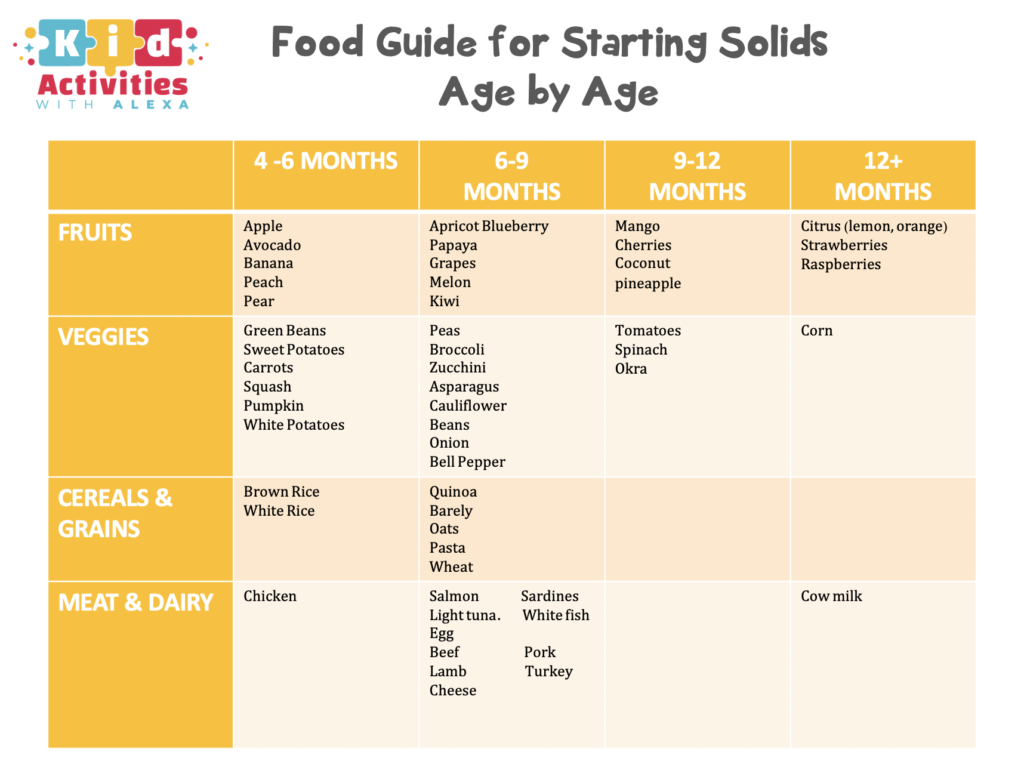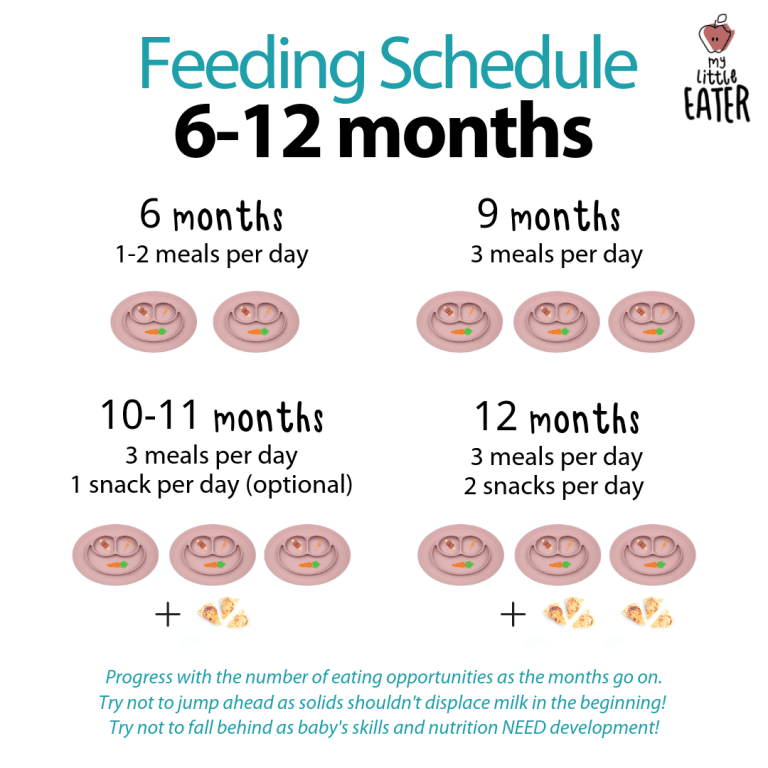Baby crying after solid food
Baby Unsettled At Night Since Starting Solids
·
Written by Jo Charnock
·
Written by Jo Charnock
On this Page:
- Scenarios and reasons why your baby is unsettled at night since starting solids
- When will my baby be ready for solids?
- Do solids help baby sleep through the night
- Some facts about milk and solids
- Important things to remember
Is your baby unsettled at night since starting solids? Or is your 6 month old gassy after starting solids? Are you concerned your baby is not sleeping enough, or your baby won’t sleep after introducing solids? This blog article aims to dispel some of the uncertainties around introducing solid foods and why your baby’s sleep pattern may be disturbed. Read on for more info!
Scenarios and reasons why your baby is unsettled at night since starting solids:
First, let’s deal with the 4 scenarios you can expect your baby to follow when introducing solids:
- The ideal; your baby was sleeping well and continues to sleep well.
- An improvement; your baby was sleeping badly but now sleeps well.
- No change; your baby slept badly and continues to sleep badly.
- Your baby was sleeping well but now doesn’t.
If you fall into points 1 or 2 then great, you have no worries, but if you fall into points 3 or 4, it sucks. Hopefully, this article will help.
YOU MAY ALSO BE INTERESTED IN:
IS YOUR 1 YEAR OLD SLEEPING A LOT AND NOT EATING?
Now let’s deal with the
5 reasons why your baby is unsettled at night since starting solids:Timing
When you first start to introduce solids it’s important to remember that it’s to supplement breast milk or formula feeds and not to replace them.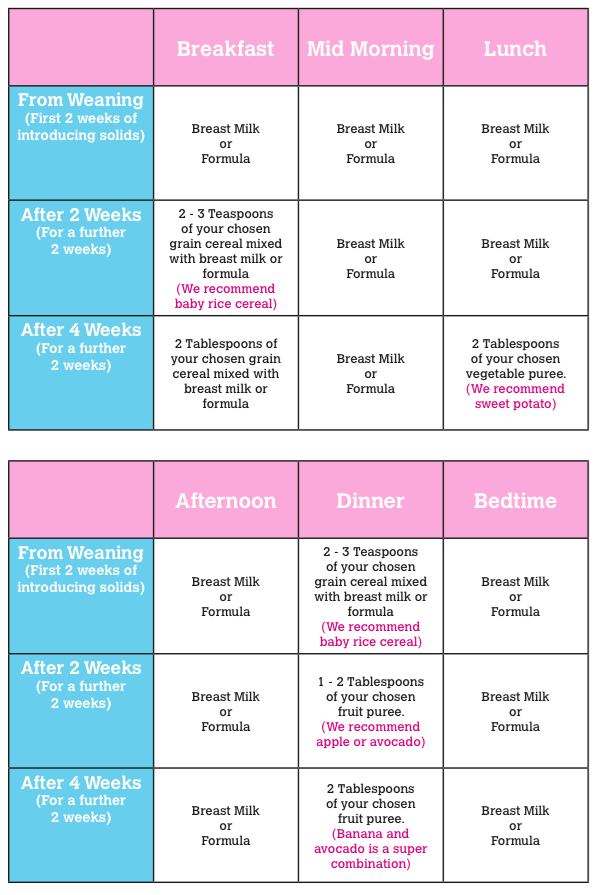 So make sure you always start with a milk feed. Wait a while and then introduce solids a small amount at a time. Try to make sure you are not feeding too close to nap or sleep time so your baby has time to digest the solid food.
So make sure you always start with a milk feed. Wait a while and then introduce solids a small amount at a time. Try to make sure you are not feeding too close to nap or sleep time so your baby has time to digest the solid food.
Think quality, not quantity
Your young baby should still be getting most vitamins and nutrients from milk. If you are feeding your baby too many solid foods and not enough milk, they may not be getting all the energy they need and will still be hungry. This will result in your baby sleeping badly and waking up for extra night feeds.
Distractions
Introducing solids usually happens between 4-6 months of age. This coincides with your baby’s increased curiosity about their surroundings. Your baby may become distracted during feed times and not take in as much milk as they should be doing. This has nothing to do with solid food but is part of natural development. It’s important to make sure your baby is taking enough milk, otherwise, they will wake for more night feeds.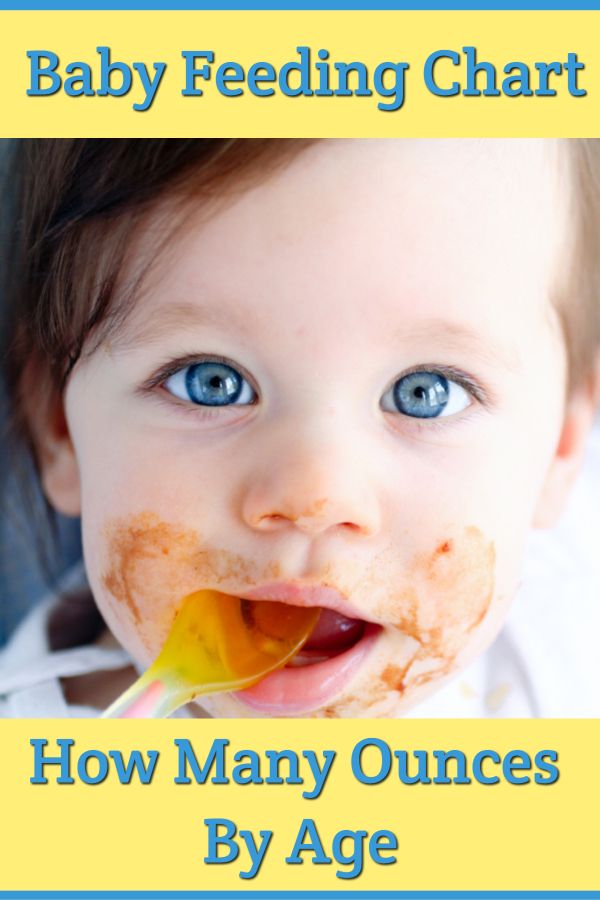 Try to regulate feeding times and be in a safe quiet place and try using tools that encourage efficient eating such as reusable food pouches and pouch spoons.
Try to regulate feeding times and be in a safe quiet place and try using tools that encourage efficient eating such as reusable food pouches and pouch spoons.
Tummy upsets
It’s quite normal for babies to have tummy upsets when they start solid foods. Your baby’s digestive system has to adapt to the change from an all-milk diet to one that includes solid foods. So, this may cause your 6 month old to be gassy after starting solids. Unfortunately, it may mean a few sleepless nights.
It may not be the food!
Is your baby unsettled after a night feed? This may be true, but baby sleep problems can be caused by many other things other than feeding. A change in routine, teething or simply being too hot or too cold can all result in your baby not sleeping. Or it may simply be caused by your baby’s stage of development.
When will my baby be ready for solids?
Starting your baby on solids is an exciting time and a developmental milestone.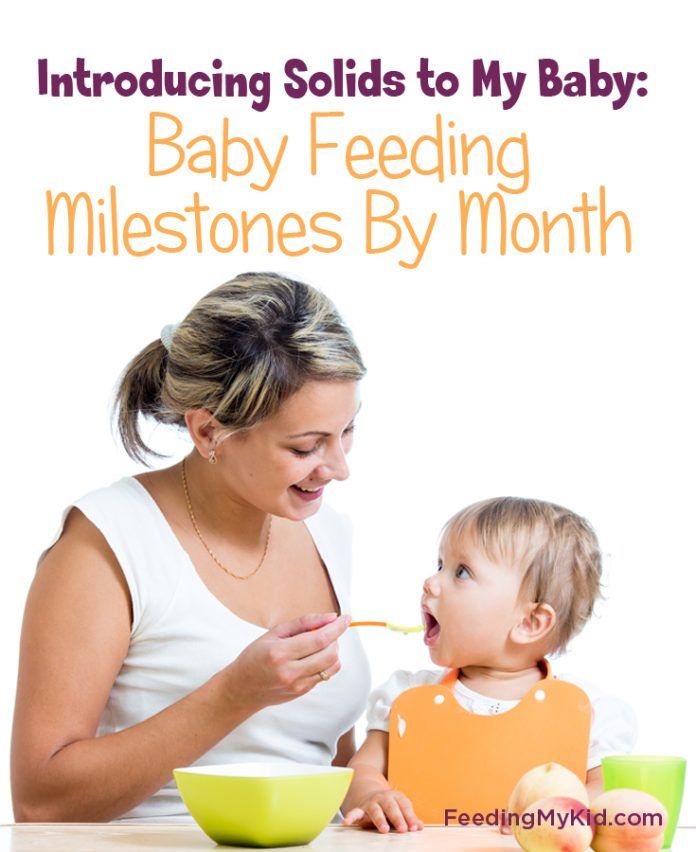 But it can be confusing for a new mum.
But it can be confusing for a new mum.
Experts recommend to start your baby on solids at around 4-6 months of age. So the signs to look out for that your baby is ready include:
- Your baby has good head & neck control,
- They can sit up on their own or in a baby chair,
- Your baby shows an interest in others’ food, such as watching what you eat and reaching for food,
- They open their mouth when presented with a spoon,
- Bub can pick things up between the thumb and forefinger.
However, you followed the signs and now you’ve noticed your 6 month old is gassy after starting solids. Or you’re worried about a baby stomach ache after starting solids. The above signs are a guide only.
If your 6 month old is gassy after starting solids or has a baby stomach ache, it may be caused by starting solid foods before your baby’s digestive system is ready. Babies can suffer from gas because they have immature digestive systems and are swallowing air during feeds.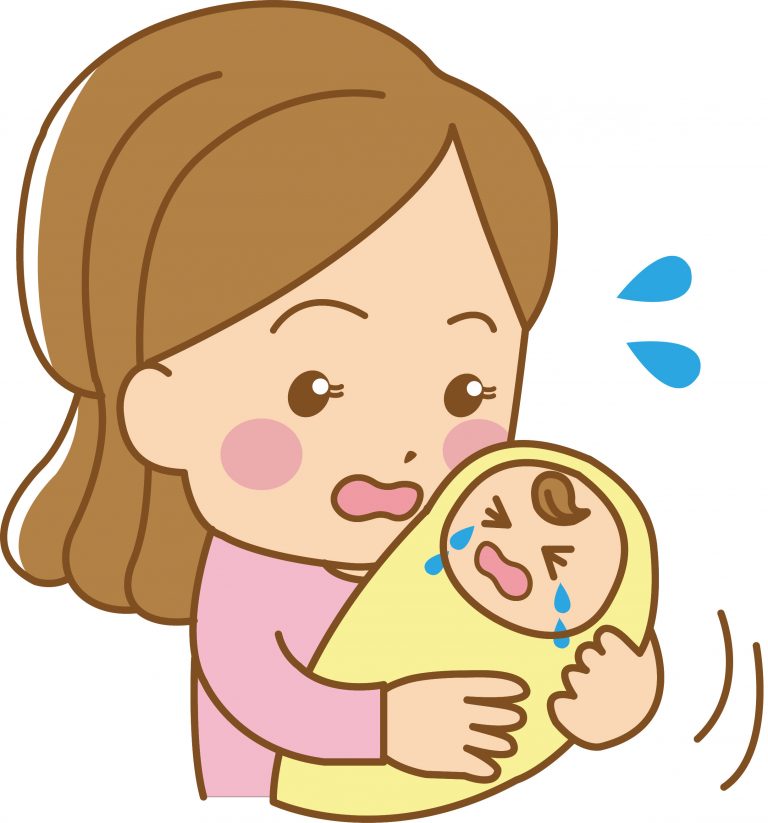 If you are concerned about this, pause with the solids for a few days, or consult your doctor.
If you are concerned about this, pause with the solids for a few days, or consult your doctor.
Click for more info about starting solids.
Click to shop solid feeding.
Do solids help baby sleep through the night
Some studies still say that giving your baby solids will help with sleep. The logic behind this theory is relatively simple: babies wake up when they are hungry, so starting solid food should help your baby sleep better (and longer) since their tummy is more full. Unfortunately, like most things involving a baby, the reality is not that simple. Although it is true that babies wake up when they are hungry, babies wake up for lots of other reasons, too.
What to feed a 6 month old baby at night?
Babies between 4 – 6 months are developmentally able to sleep through the night without a feed. However, this doesn’t always happen. Breast milk or formula is still your baby’s primary source of nourishment, but if you are wondering what to feed a 6 months old baby at night the following list is useful:
- Oatmeal or porridge – is an extremely healthy meal for both babies and adults.
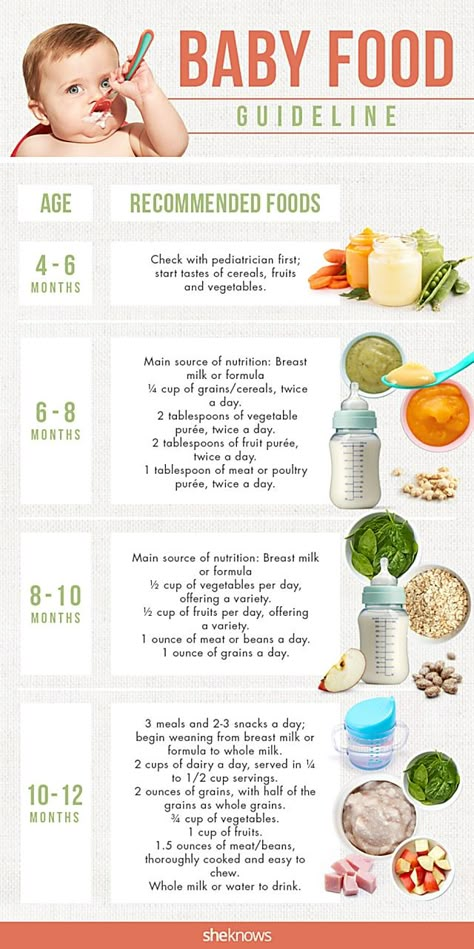 Oatmeal is an excellent source of melatonin which helps trigger insulin production, which in turn helps to induce sleep!
Oatmeal is an excellent source of melatonin which helps trigger insulin production, which in turn helps to induce sleep! - White rice – several scientific studies have found that rice helps people sleep better and faster. Try making a simple rice pudding to feed your baby before putting them down to sleep.
- Bananas – bananas are loved by both mums and babies for their soft texture and sweet taste. But did you know that they contain a good amount of magnesium which is a natural muscle relaxant? Relaxed muscles mean your baby should feel sleepier after dinner and should help them sleep better.
- Dairy products – for adults and children alike, a warm milky bed time drink helps everyone to sleep better. But did you know other dairy products like yogurt and cheese can help your little one feel sleepy? Dairy contains essential amino acids that help with a better nights sleep.
Some facts about milk and solids
- Milk is still the most important food for a baby up until they’re 8-12 months old, so you should always offer a milk feed before solids until they reach this age.
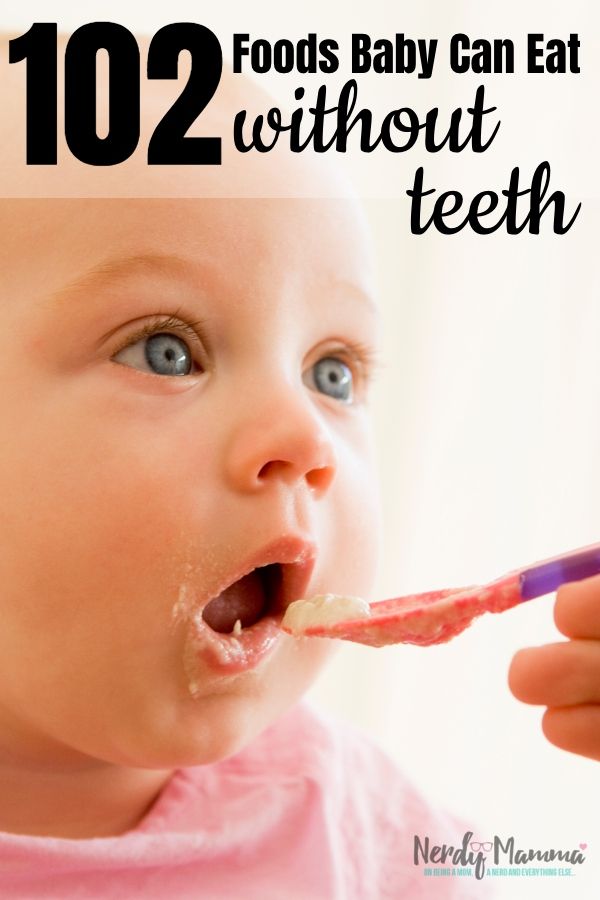 In the beginning, solid food works like a top-up for your baby, rather than replacing actual milk feeds.
In the beginning, solid food works like a top-up for your baby, rather than replacing actual milk feeds. - After 8 months, you can start to offer solids before milk feeds and gradually start to replace some of the milk feeds during the day (eg, lunch).
- Babies need a combination of protein and iron in their diet from 6 months onward. This helps them feel full enough to sleep well at their lunchtime nap and also overnight. Breast milk contains very little to no iron, but babies are born with enough iron stores to last their first 6 months or until you start introducing solids.
- Only give protein to babies under 10 months at lunchtime, so they have enough time for it to digest. Protein given at dinner to a baby younger than 10 months can cause baby sleep problems as their fragile digestive system will struggle to cope.
Important things to remember
Starting solids will not be the miracle cure for a good nights sleep. It will take time for your baby to adapt to solids and to be taking enough for them to be ‘full’.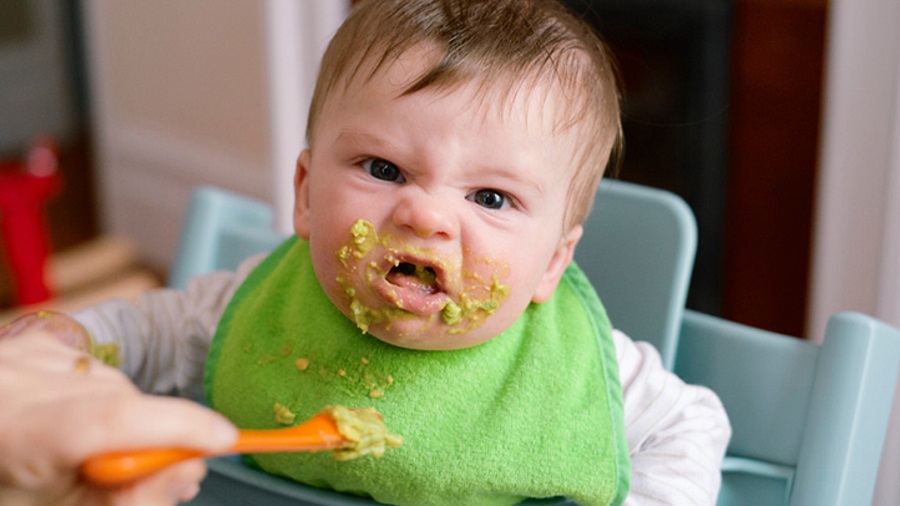 Introduce new foods slowly and allow a few days in between to check for any allergic reactions.
Introduce new foods slowly and allow a few days in between to check for any allergic reactions.
Introducing solids can cause tummy upsets which may result in your baby not sleeping enough. Keep an eye on your baby’s nappy, how often they need changing and the colour and texture of the poop. If you are concerned about your baby’s bowel movements always consult a health care worker.
References
The Baby Center 2018, Why is my baby sleeping worse now he’s started solids?, Baby Center, viewed at 02 Jan 2020, URL
Glow Dreaming, 2019 Introducing Solids: How it can affect your babies sleep, Glow Dreaming, viewed at 01 Jan 2020, URL
Baker, N 2019, SOLIDS! The when, what, how of solid food.The Little Ones, viewed at 05 Jan 2020, URL
Tagged in
- Starting solids
Continue reading
Food Blender vs Food Processor
How To Warm A Baby Bottle Safely
Do I Really Need A Baby Food Maker & Processor?
Why Baby Crying While Eating Solids?
Baby
ByWinters
HoursUpdated:
Many parents are concerned about their baby’s eating habits and whether or not they are eating solid foods. It might not signify anything wrong if your baby is crying while eating solids.
It might not signify anything wrong if your baby is crying while eating solids.
The cry might simply be a reflexive response to the stimulation of eating and may gradually subside as your baby becomes more used to the new experience.
However, if your baby constantly cries while eating solids, there may be a problem. It could mean that they do not feel comfortable with the experience and are not enjoying it.
This can signify that your baby isn’t getting enough source of nutrition or is experiencing another issue. If you’re concerned about your baby’s eating habits, keep reading to discover how to introduce solids.
Introducing solid foods to a babyIf you are ready to introduce solid foods to your baby, you should know a few things. First, make sure your baby is healthy enough to eat solid foods. If your baby has a fever, is not eating well, or has other signs of illness, wait until he or she is better before introducing solid foods.
Second, feed your baby slowly and carefully to avoid choking. Besides, don’t put pressure on the body. Start with soft baby foods like pureed fruits and vegetables and move on to harder solids.
When introducing solid foods to your baby, it is essential to be careful not to overwhelm them. Start with small amounts of pureed fruits and vegetables, followed by cooked meats and poultry.
You can also try giving your baby a small amount of breast milk or formula mixed with pureed foods. Babies are often hesitant to try new foods at first, but with consistency and patience, they will eventually become interested in solid foods.
When to introduce solids to your babyIntroducing solid foods to your little one seems like a big decision, but it may have a significant impact on their health and development. Start giving your baby solids when your baby reaches 6 months old6 months is the age at which most babies become interested in food.
By this point, they’ve developed enough motor skills to grab objects and try to put them in their mouths. This means it’s time to introduce them to solid foods. There isn’t a specific timetable for when you should start giving your baby solids, but you should generally start by offering small pieces of soft food.
This means it’s time to introduce them to solid foods. There isn’t a specific timetable for when you should start giving your baby solids, but you should generally start by offering small pieces of soft food.
You may try combination feeding with breastmilk or formula milk and some soft solids. Once your baby shows interest in these small couple of bites, gradually increase the size of the pieces until they’re eating solid foods. Be patient! Remember that Introducing a solid meal to your baby is a gradual process.
Don’t overdo it too much too soon can cause your baby to develop food allergies or vomiting. Instead, be gentle and let your baby explore their world through food. Also, monitor the baby’s poop colors to check how the diet affects them.
Possible reasons baby may cry while eating solidsHere are some common reasons your baby may be crying while eating solids:
Hungry/Full:If your baby is crying because he is hungry/full, give him some breast milk or formula as soon as possible.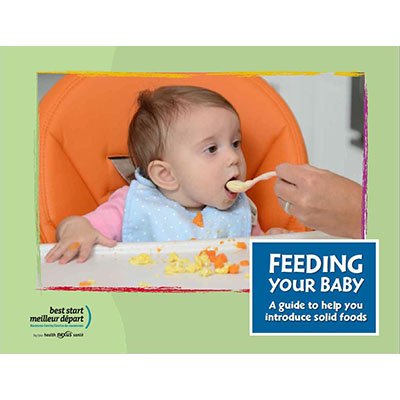 If he is still crying after you’ve given him a meal, try giving him smaller meals more frequently throughout the day.
If he is still crying after you’ve given him a meal, try giving him smaller meals more frequently throughout the day.
When trying to eat new solids, the baby may easily feel overwhelmed and tired. It may also make the baby feel uncomfortable.
If your baby is crying because he’s under too much stress, try to relieve his stress by doing something he enjoys, such as holding him, going for a walk outside, or reading him a story.
Some babies cry or are colicky baby at the beginning of the breastfeeding schedule. Similarly, eating solids may be new to them to feel comfortable enough.
Teething:A teething baby may become fussy and less willing to try new foods. When a teething baby may want breast milk instead of new solid foods.
Learn how to ease a teething baby to offer comfort. Another way to soothe teething babies is to give them frozen vegetables and bananas.
New texture:A new food may send the baby into a sensory shock. Some babies may not like a particular food because of its texture. With some trials, you may have to figure out the best texture and food combinations.
Some babies may not like a particular food because of its texture. With some trials, you may have to figure out the best texture and food combinations.
Some babies may prefer pureed fruits and vegetables. On the other hand, some may like apples or carrots cut into bite-size pieces.
Tips for introducing certain solid foods to your baby’s dietWhen introducing solid foods to your baby, it’s essential to keep in mind their developmental stage and dietary needs. Here are some tips for introducing certain solids to your baby’s diet:
- Start by offering small breast milk or infant formula diluted with water as the first food. Once your baby is able to consume these diluted feeds without any problems, gradually increase the number of solids offered.
- Introduce boiled vegetables and mashed bananas as the first solid foods to infants. Be sure to offer plenty of fluids with this meal, so your baby gets the hydration they need.
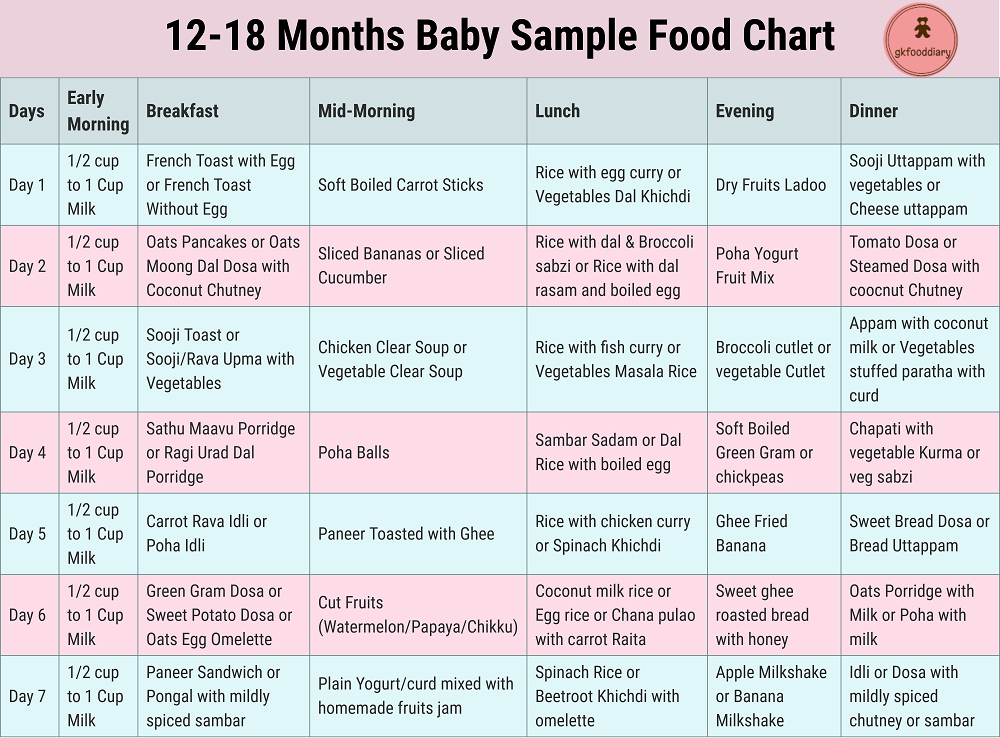
- Offer fruits and vegetables early on, but be gentle when trying to feed them to your infant. Try cutting up small pieces and feeding them one at a time so your baby can control how much they eat.
- Feeding your infant fruits and vegetables does not mean they need to start eating table food immediately – they can enjoy these foods later on once they are more developed and have learned how to eat properly.
- Wait until your baby is 6-7 months old before giving them dairy products, such as cow’s milk or cheese. This is because babies can’t digest these foods well before this age. If you do decide to introduce dairy products to your baby’s diet, be sure to give them in moderation.
By observing your baby’s eating habits and reacting accordingly, you can help them learn how to eat effectively. If your baby cries while eating solids, try to stay calm and reassure them that everything is okay.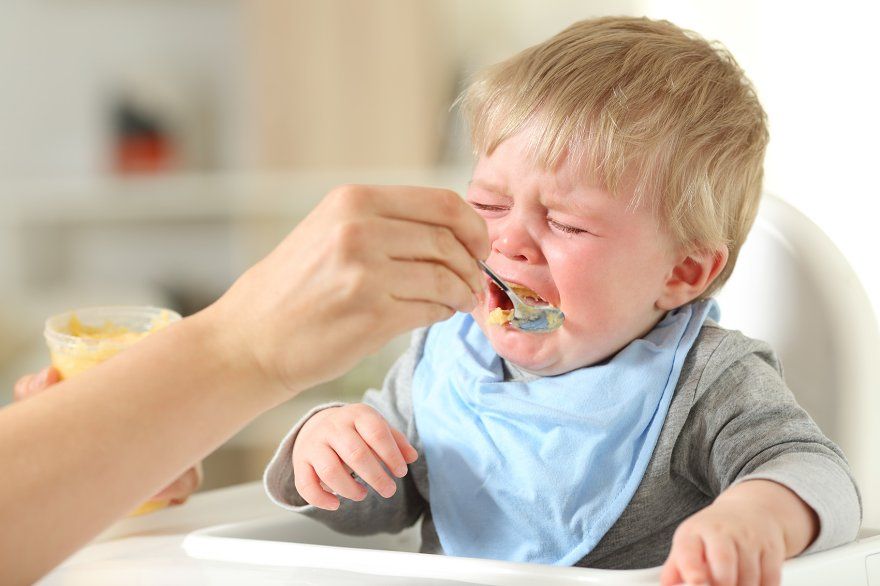 Introduce semi-solid food along with milk.
Introduce semi-solid food along with milk.
Try to provide a safe and comfortable environment for them to eat in, such as sitting on your lap or a chair with back support. If the crying continues after trying these measures, it may be necessary to consult with a doctor to keep your kid a healthy baby.
Faqs:Why does my baby cry when I feed her baby food?Your infant may cry after eating for a variety of reasons, such as colic, gas, formula, acid reflux (gastroesophageal reflux disease), and food sensitivity or allergy. It is not necessary to nurse your child whenever they cry.
Should I worry about my baby gaining too much weight?However, unless it is creating issues for the mom or the baby, oversupply is not a problem. Rarely, health issues such as congestive heart failure, renal abnormalities, and/or endocrine diseases might be linked to excessive weight gain. It is even more crucial to keep breastfeeding if the kid has health issues.
Add some pureed pears or applesauce to the cereal for a terrific first fruit. She could be moved to open wide by the additional taste and texture. Alternatively, try a different kind of baby cereal. Some daring palates prefer the stronger flavors of barley or oats to the soft milkiness of rice.
References:https://www.redcross.org.uk/first-aid/learn-first-aid-for-babies-and-children/choking-baby#:~:text=Give%20up%20to%20five%20chest,and%20may%20dislodge%20the%20blockage.
https://intermountainhealthcare.org/blogs/topics/intermountain-moms/2015/11/teething-and-babies/
1 shares
8 reasons why a child refuses to eat
Our life is impossible without food. From birth, a child has an instinct for eating. And with age, he does not cease to understand whether he wants to eat or not.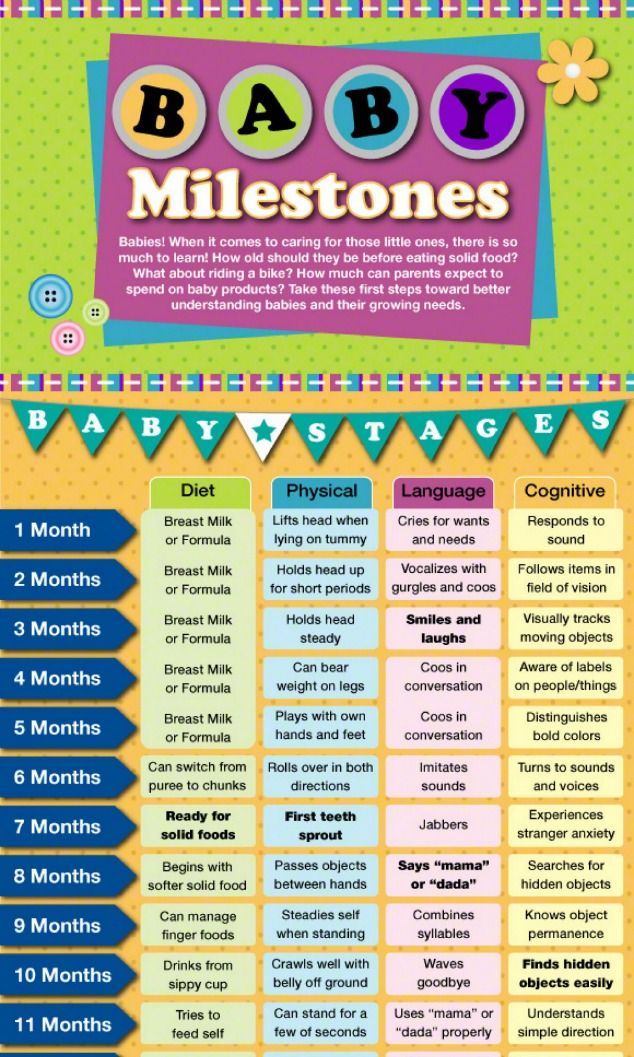 Therefore, forcing a child to eat on the part of the parents is wrong. If the child grows and develops normally, then let him eat what he wants and how much he wants. Forcing the baby to eat, you can easily break his natural sense of proportion, and then fight overeating and being overweight. All children are different and it is important to give the child the amount of food that will satisfy his needs. And these needs depend on various factors. If the little one refuses to eat, try to understand the reason for this behavior.
Therefore, forcing a child to eat on the part of the parents is wrong. If the child grows and develops normally, then let him eat what he wants and how much he wants. Forcing the baby to eat, you can easily break his natural sense of proportion, and then fight overeating and being overweight. All children are different and it is important to give the child the amount of food that will satisfy his needs. And these needs depend on various factors. If the little one refuses to eat, try to understand the reason for this behavior.
1. The child is not hungry. Even if a long time has passed since the last meal, it is possible that the child is still full. Parents should take into account the calorie content of food and the energy consumption of the child. If the meal was high in calories, but after that the child watched cartoons and did not run in the yard, then he may not want to eat for a long time. Physical activity encourages the body to expend energy and the child will get hungry faster.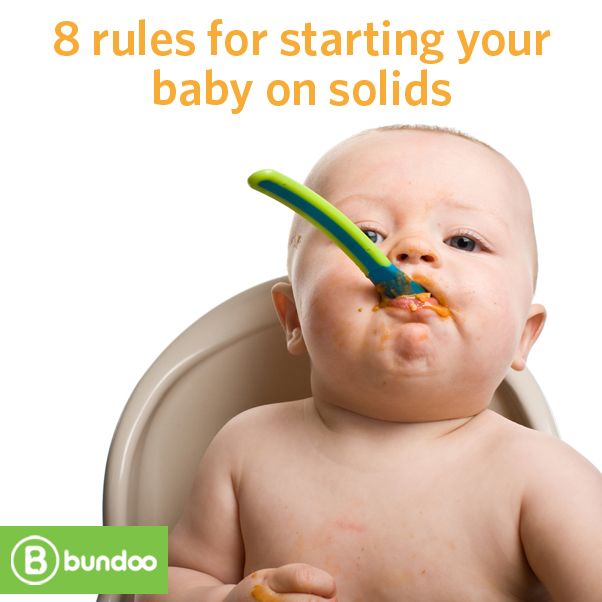
2. The child does not have a daily routine. It is advisable to feed the baby at about the same time. The optimal portion for a child is two of his palms folded together. In addition, it is necessary that the child every day spend time in the fresh air and go to bed on time. If the child has little active pastime, then do not be surprised that he does not eat well.
3. The child is ill. Lack of appetite may be a symptom of some disease. Many children begin to eat badly when they are teething. Often the child refuses food when he has a fever. Before forcing a child to finish eating porridge, make sure that he is healthy.
4. The child "interrupts" the appetite. Sometimes snacking can cause a child to eat poorly at lunch or dinner. Do not give any cookies or sweets if you plan to sit down at the table soon.
5. The child does not like a particular dish. The baby may not refuse food in general, but simply milk porridge or borscht.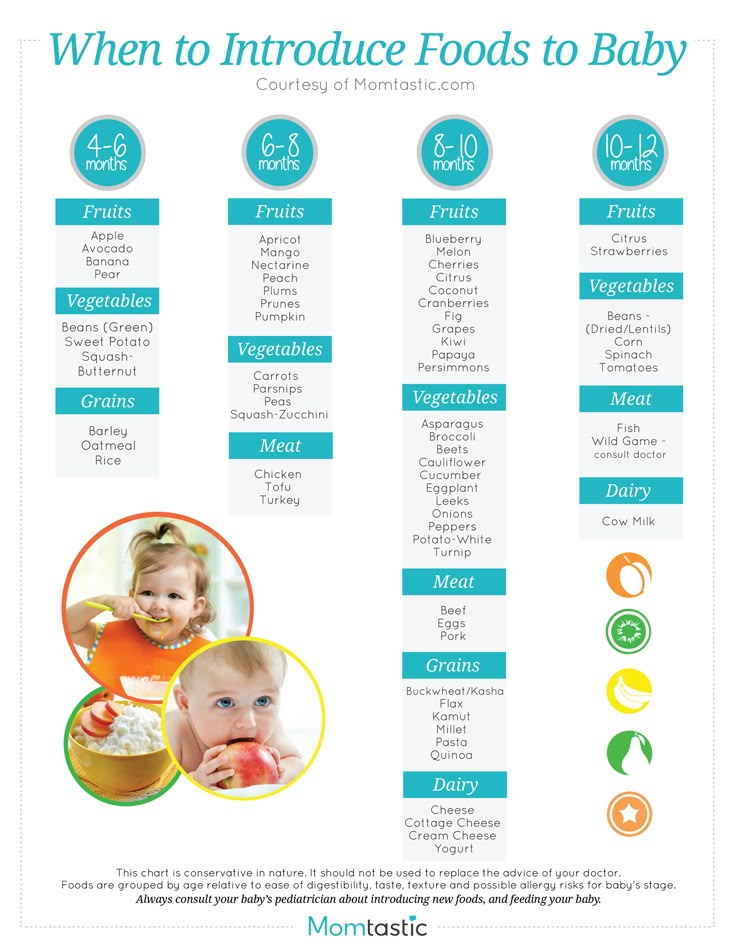 Everyone has their preferences and kids have them too. Consider your child's preferences when planning menus. Accustom the little one to new tastes gradually, in the same way as complementary foods were introduced. Children are reluctant to perceive new tastes, but if given often and a little bit, they get used to it.
Everyone has their preferences and kids have them too. Consider your child's preferences when planning menus. Accustom the little one to new tastes gradually, in the same way as complementary foods were introduced. Children are reluctant to perceive new tastes, but if given often and a little bit, they get used to it.
6. The child has psychological problems. Children subtly feel the psychological situation in the family. Refusal to eat may be associated with a desire to attract the attention of parents to their person.
7. The child developed an eating neurosis. If parents force the child to eat regularly, without taking into account his desire, then the baby may develop food neurosis. Such children begin to cry at the sight of a plate, they can run away to another room and become hysterical.
8. All children are different. Do not compare your child with other children. All have their own physical characteristics. If the baby eats little, just make these small portions as healthy and nutritious as possible, but do not force him to eat more than he wants.
If the baby eats little, just make these small portions as healthy and nutritious as possible, but do not force him to eat more than he wants.
Do not treat the refusal of food as disobedience and whims. Try to understand what the problem is and solve it. Think and analyze your behavior, did you do everything as it should? If you realize what you did wrong, then try to quickly correct your mistakes. Use methods such as fairy tale therapy. Before going to bed, the child will listen with pleasure about his favorite fairy-tale hero, who ate well, so he was strong and courageous. Try to interest the child in the beautiful design of the dish. Ordinary products can become a castle, a car, a cute face - there is room for parental imagination to roam.
Why does the baby cry - articles from the specialists of the clinic "Mother and Child"
Bondarenko Margarita Gennadievna
Otorhinolaryngologist (ENT)
Clinic "Mother and Child" Kuntsevo,
I want to eat!
Most often the baby cries because he wants to eat. And to understand that he is hungry is the easiest way. At first, the baby shows concern, smacks his lips, turns his head to his mother's hand, stroking his cheek, tries to put his own fist in his mouth. All this means that there is very little time left before the hungry cry. Noticing such signs, you should not wait: feed the baby on demand. Otherwise, starting to cry, he will have to spend a lot of energy trying to calm down, and therefore, he will eat less and the next time he will get hungry again too soon. In general, for children who are breastfed, during the first month of life there is no clear feeding regimen. A newborn can be applied to the breast up to 10-12 times a day.
And to understand that he is hungry is the easiest way. At first, the baby shows concern, smacks his lips, turns his head to his mother's hand, stroking his cheek, tries to put his own fist in his mouth. All this means that there is very little time left before the hungry cry. Noticing such signs, you should not wait: feed the baby on demand. Otherwise, starting to cry, he will have to spend a lot of energy trying to calm down, and therefore, he will eat less and the next time he will get hungry again too soon. In general, for children who are breastfed, during the first month of life there is no clear feeding regimen. A newborn can be applied to the breast up to 10-12 times a day.
I want to sleep!
The next reason for screaming is, oddly enough, the desire to sleep. Many parents think that a baby can fall asleep anytime, anywhere, and even in almost any position. No, it's not like that - he needs help. How do you know if your baby wants to sleep? It's easy to guess. At first, he will behave restlessly, cry, push out the pacifier, rub his eyes, yawn. And then he starts crying. Here, too, it is necessary to try to calm the child as quickly as possible so that he does not disperse in crying, otherwise it will be more difficult for him to fall asleep. Rituals will help: you can shake the baby, sing a song, put it in the usual sleeping place.
At first, he will behave restlessly, cry, push out the pacifier, rub his eyes, yawn. And then he starts crying. Here, too, it is necessary to try to calm the child as quickly as possible so that he does not disperse in crying, otherwise it will be more difficult for him to fall asleep. Rituals will help: you can shake the baby, sing a song, put it in the usual sleeping place.
I'm wet!
Crying can be a signal that the baby is uncomfortable: for example, his diaper is wet. Cold and wet, they irritate the skin, so he screams: “Mom, dad, change me quickly!” Crying about this is whimpering, incessant, although it sounds either stronger or weaker, it may be accompanied by hiccups, as the child freezes in wet diapers. If the diaper is changed, and the baby is warmer to cover, he will calm down. If the child is not in diapers, but in reusable diapers, you should not relax either: they can leak or get wet inside. So, the baby is also wet and cold. If the child sleeps in one diaper all night, then he may be disturbed by a greatly increased diaper volume.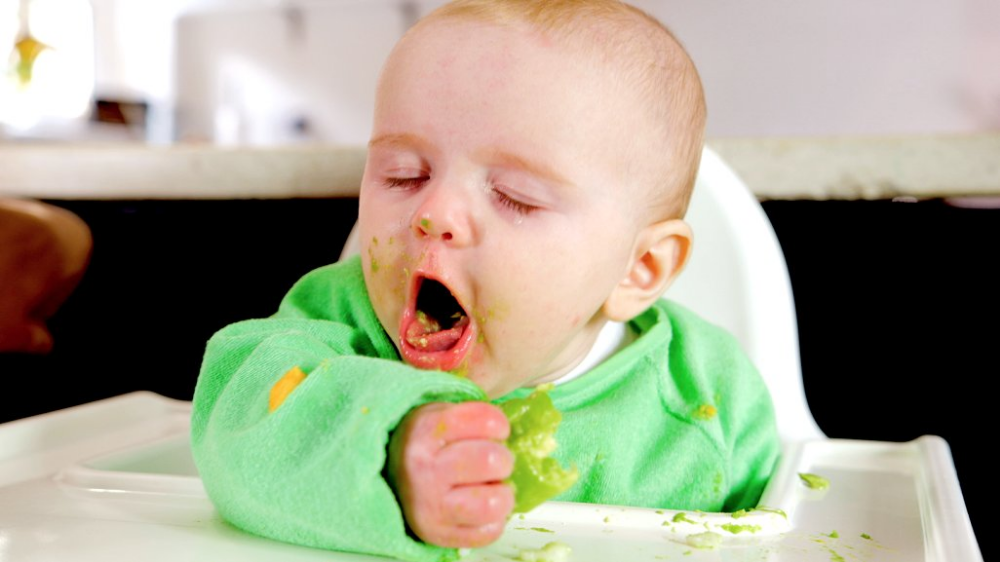 And of course, children do not like to be in dirty diapers (diapers): feces quickly irritate delicate skin.
And of course, children do not like to be in dirty diapers (diapers): feces quickly irritate delicate skin.
I'm hot!
If the baby is hot, he will also cry about it. He will begin to whimper, scatter his arms and legs, his skin will turn red, a small red rash (prickly heat) may appear under his clothes. At the same time, the temperature of the baby sometimes even rises to 37.5 ° C. This is what saves here: the child must be undressed (and removed diapers, especially disposable ones), wiped with a towel moistened with water at room temperature, and allowed to lie in the air for several minutes. Then you need to dress the baby, but in other, clean clothes. In the fight against overheating and prickly heat, a reasonable amount of clothing and a comfortable room temperature - no higher than 24-25 ° C will help, first of all.
I'm uncomfortable!
The reason for the inconvenience can be any: the child may cry when the temperature changes, when changing clothes, changing the diaper or wiping his bottom with a damp cloth.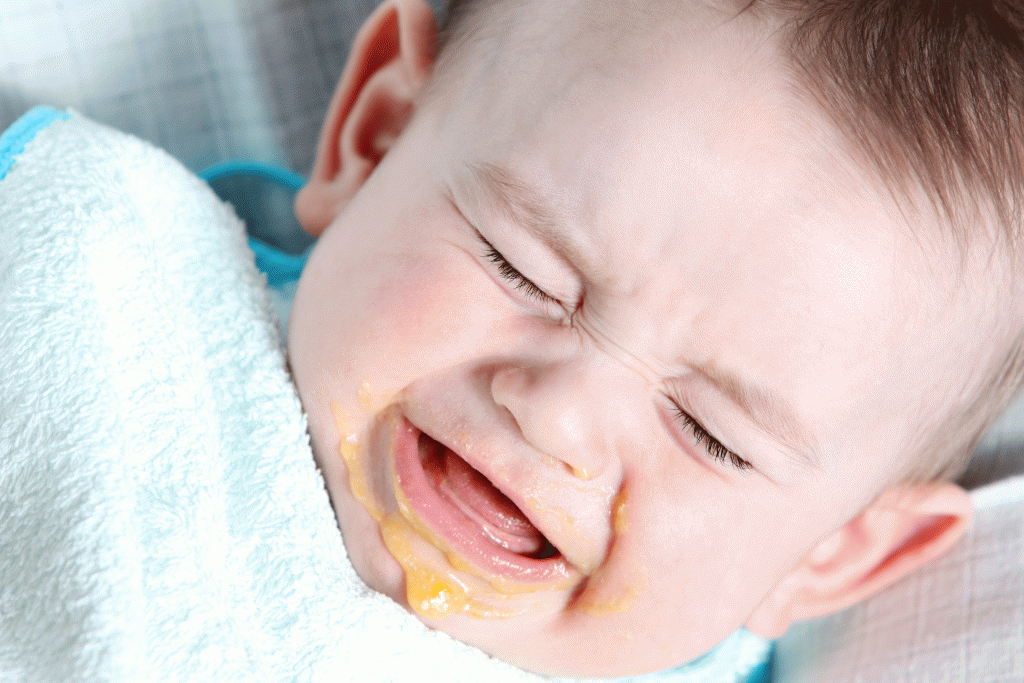 Newborns feel more comfortable when they are dressed or wrapped in diapers, because the touch of air on the skin is not always pleasant for them. In addition, children often do not like to be changed, especially if it is winter and you have to wear a lot of clothes. There is only one way out: learn to act as quickly as possible, causing the crumbs a minimum of inconvenience.
Newborns feel more comfortable when they are dressed or wrapped in diapers, because the touch of air on the skin is not always pleasant for them. In addition, children often do not like to be changed, especially if it is winter and you have to wear a lot of clothes. There is only one way out: learn to act as quickly as possible, causing the crumbs a minimum of inconvenience.
A few words about clothes. It is better not to buy clothes with fasteners on the back and coarse seams inside - the baby may not like it. And sometimes even the slightest thread or hair caught between the clothes and the skin of the baby causes him great inconvenience.
I want attention!
Attention and tactile sensations are very important for a child. He loves to see the faces of his mom and dad, hear their voices, communicate with them. But so far, the baby cannot ask his parents to take him in his arms, read him a fairy tale, sing a song, play - but this does not mean at all that he does not need it.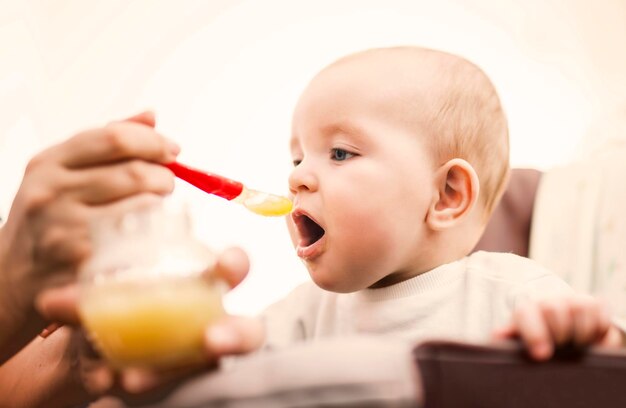 Therefore, crying, the baby wants to be paid attention to, requires communication. Do not worry that the baby will get used to the hands too much. While he is so small, he needs to feel a sense of security - it is this that will later help him gain confidence in his abilities. Well, different cradles, deck chairs, playpens, child seats will only help mom and dad free their hands and at the same time place their beloved child next to them.
Therefore, crying, the baby wants to be paid attention to, requires communication. Do not worry that the baby will get used to the hands too much. While he is so small, he needs to feel a sense of security - it is this that will later help him gain confidence in his abilities. Well, different cradles, deck chairs, playpens, child seats will only help mom and dad free their hands and at the same time place their beloved child next to them.
Once you learn to understand your baby's "language", you will see that the reasons for crying vary from case to case. A little time and patience - and very soon you will understand what the child wants, already from the first seconds of his discontent.
Make an appointment
to the doctor - Bondarenko Margarita Gennadievna
Clinic "Mother and Child" Kuntsevo
Pediatric otorhinolaryngologyFor childrenDispanserizationMonitoring of children at home0003
By clicking on the send button, I consent to the processing of personal data
Attention! Prices for services in different clinics may vary.